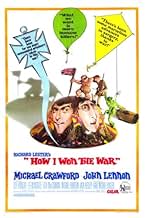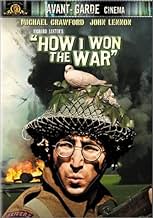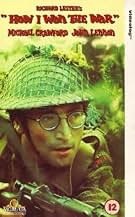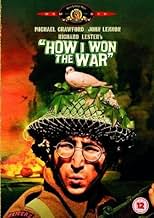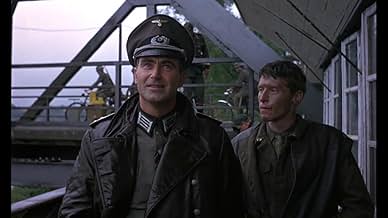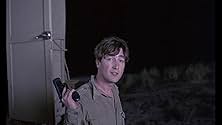IMDb-BEWERTUNG
5,5/10
2622
IHRE BEWERTUNG
Die Geschichte eines britischen Kommandeurs während des Zweiten Weltkriegs, der seine Truppen in eine Reihe von Missgeschicken in Europa und Nordafrika bringt.Die Geschichte eines britischen Kommandeurs während des Zweiten Weltkriegs, der seine Truppen in eine Reihe von Missgeschicken in Europa und Nordafrika bringt.Die Geschichte eines britischen Kommandeurs während des Zweiten Weltkriegs, der seine Truppen in eine Reihe von Missgeschicken in Europa und Nordafrika bringt.
- Regie
- Drehbuch
- Hauptbesetzung
Empfohlene Bewertungen
'How I Won the War' has to be one of the most original, bizarre and imaginative war films ever made. I first saw it late one night as an impressionable kid and immediately was drawn by its unusual style and narrative. To have the film tinted in several different colours to show the stages of the war was both daring and cool. One gets the feeling of having witnessed something larger, more intimate and important than just a mere war movie.
There are no real heros in this film, certainly Michael Crawford and his troop are pretty cowardly and inept, whereas the Germans are depicted, in the raid on the fuel dump scene, as being content with religious service and a bit of soccer.
It is true that history is written by the victors and Michael Crawford's character, Goodbody, is one of only two survivers from his regiment. He proudly states at the very end of the film that he "won the war". Maybe he did, but his actions and his balmy enthusiasm show us just how idiotic war can be.
My favourite scene was the one with Goodbody and the German officer who befriends Goodbody for much of the film. Together, they talk about how cruel both the British and Germans are, and how the German officer has killed many Jews. Goodbody then talks about how he got his commission and why he is fighting. It ends with the German officer telling Goodbody that he (Goodbody) is a fascist. "Am I?", replies Goodbody, "but I don't particularly dislike Jews."
When the very affable German officer, who is attempting to surrender, is blindly run over by an advancing British tank, we know that in this war the good, the bad and the ugly become mixed up and inseperable.
I currently own a very worn out video of the film and am hoping it will be released soon on DVD here in Australia.
There are no real heros in this film, certainly Michael Crawford and his troop are pretty cowardly and inept, whereas the Germans are depicted, in the raid on the fuel dump scene, as being content with religious service and a bit of soccer.
It is true that history is written by the victors and Michael Crawford's character, Goodbody, is one of only two survivers from his regiment. He proudly states at the very end of the film that he "won the war". Maybe he did, but his actions and his balmy enthusiasm show us just how idiotic war can be.
My favourite scene was the one with Goodbody and the German officer who befriends Goodbody for much of the film. Together, they talk about how cruel both the British and Germans are, and how the German officer has killed many Jews. Goodbody then talks about how he got his commission and why he is fighting. It ends with the German officer telling Goodbody that he (Goodbody) is a fascist. "Am I?", replies Goodbody, "but I don't particularly dislike Jews."
When the very affable German officer, who is attempting to surrender, is blindly run over by an advancing British tank, we know that in this war the good, the bad and the ugly become mixed up and inseperable.
I currently own a very worn out video of the film and am hoping it will be released soon on DVD here in Australia.
Wow, it is not everyday that one comes across a right-wing essay on the IMDB as one of the posters did in regards t this film. First of all, I am delighted to have finally seen this. Aside from "The Royal Flash" and "Cuba," I believe I have seen most of Richard Lester's films which are of significance. I think too look at this film from a mere political pov is a mistake. It is a good statement first of all about how utterly ridicilous the war process is. Sure, there are awful people like Hitler and Mullah Omar, out there who threaten the world at large but by and large, the war process rarely leads to any resounding political solutions and long-term peace and understanding. I think even people who generally support their government's wars would agree to this sentiment. Lester does a brilliant job of poiting this out through the course of this film, and he is helped by some great acting- including a surprisingly brilliant John Lenon to achieve this great satire. Lester, who was actually born in Philadelphia, has a great sense of man's moral faults and he reflects that in this film, as well as in "Petulia"- which is considered to be his best film. I think Lester's genius can even be seen in his two most blatant commerical ventures, "Suprman II" and "Butch and Sundance: The Early Years" as well as the Beatles movies. He deserves more respect, and I think one day he just might get it.
I seem to recall liking this upon its original theatrical release and certainly looked forward to seeing it again. My interest had been rekindled by a recent visit to Ameria, in Spain where the cast and crew retired to each day after filming in the nearby desert location, popularly known as 'mini Hollywood'. Unfortunately, although very well intentioned and in some ways hard hitting, for me the encouraged silliness of Crawford and others, now makes it a difficult watch. Undeniably famous for introducing the 'working class' spectacles to John Lennon and for being the time and place where he would compose 'Strawberry Fields Forever', there are at least lasting elements to a brave but flawed venture.
An anti-war film in disguise... As a "fan" of war films but also a "peacenik" I love this movie. Aside from the fact that i am an overtly biased Beatles' fan this film is an intellectual riot. John Lennon co-stars with the star of Hello Dolly as members of a British military unit saddled with the ridiculous duty of building a cricket pitch during the invasion of North Africa! Filled with ironic black war humor, it suffers a little from the predictable muddle of most 60's films.
Something interesting to note is that John Lennon is first seen wearing his trademark round spectacles in this movie. Having been asked (for some reason) to wear the glasses for the film he continued to wear them for the rest of his life!
This movie is a must for all Lennon fans.
Something interesting to note is that John Lennon is first seen wearing his trademark round spectacles in this movie. Having been asked (for some reason) to wear the glasses for the film he continued to wear them for the rest of his life!
This movie is a must for all Lennon fans.
No, this not a "lost gem", as some reviewers excitedly proclaim. Far from it.
"How I Won the War? I Bored Them to Death". Main deficiency: a very boring movie. Another deficiency: the gags are practically all unfunny. It's a typical 60s British comedy; good cast, but an atrocious script. Well filmed, though; visually it's pretty decent. However, good for only one or two chuckles. And it was more like a hopeful chuckle, sort of like "I hope this is a sign that something genuinely funny is coming up soon". "How I Can Bore You" would be a more appropriate title. Very disappointing.
A little word about John Lennon, for all you left-wing Lennon fans. (The music is great, hence that's not the issue here.) Lennon was a working-class kid with very little education and even less natural intelligence. His pathetic attempts at "spiritual contentment" - or whatever he used to call it - with that charlatan of an Indian guru sect-leader, plus his marriage to the even bigger charlatan, the totally talent-free Yoko Ono, prove this without an iota of a doubt. He was a very gullible person, what Americans would call "a sucker". But if that isn't enough, his meddling in international politics proved that he had also completely lost his mind by the time he left "The Beatles" and the 70s arrived. Drugs? Too much fame going to his head?
He was also a stark-raving hypocrite, as most "do-gooders" are. All that the world's do-gooders care about is their fame and their image; after all, they have huge EGOS to feed. An example... Michael Caine, in his autobiography "What's It All About?", relates the following episode from the mid-60s when he met Lennon. They were in a luxurious French hotel, desperately looking for a bathroom. All the bathrooms were taken. So John went to a room and urinated from a window. Caine saw him and said angrily that John had stained the curtains. And what was John's reply to this?
"They're rich. F*** 'em."
Of course, the fact that he himself was rich at that point (not to mention later) was of no consequence. Because if someone had decided to stain HIS curtains, in HIS home with urine or excrement, I guess he would have blown his top, screaming injustice. And he'd probably have called the police. The "pigs". Yes, he was so anti-authority, except of course when he needed them to serve HIS little purposes. Just another "do-gooder" hypocrite...
"All we are say-ing, is give peace a chance". If peace is responsible for "heroes" like Lennon, then I'm all for war.
For my review of "Imagine", go to: http://rateyourmusic.com/collection/Fedor8/
To make this IMDb's most unpopular comment ever, please click "No" below.
"How I Won the War? I Bored Them to Death". Main deficiency: a very boring movie. Another deficiency: the gags are practically all unfunny. It's a typical 60s British comedy; good cast, but an atrocious script. Well filmed, though; visually it's pretty decent. However, good for only one or two chuckles. And it was more like a hopeful chuckle, sort of like "I hope this is a sign that something genuinely funny is coming up soon". "How I Can Bore You" would be a more appropriate title. Very disappointing.
A little word about John Lennon, for all you left-wing Lennon fans. (The music is great, hence that's not the issue here.) Lennon was a working-class kid with very little education and even less natural intelligence. His pathetic attempts at "spiritual contentment" - or whatever he used to call it - with that charlatan of an Indian guru sect-leader, plus his marriage to the even bigger charlatan, the totally talent-free Yoko Ono, prove this without an iota of a doubt. He was a very gullible person, what Americans would call "a sucker". But if that isn't enough, his meddling in international politics proved that he had also completely lost his mind by the time he left "The Beatles" and the 70s arrived. Drugs? Too much fame going to his head?
He was also a stark-raving hypocrite, as most "do-gooders" are. All that the world's do-gooders care about is their fame and their image; after all, they have huge EGOS to feed. An example... Michael Caine, in his autobiography "What's It All About?", relates the following episode from the mid-60s when he met Lennon. They were in a luxurious French hotel, desperately looking for a bathroom. All the bathrooms were taken. So John went to a room and urinated from a window. Caine saw him and said angrily that John had stained the curtains. And what was John's reply to this?
"They're rich. F*** 'em."
Of course, the fact that he himself was rich at that point (not to mention later) was of no consequence. Because if someone had decided to stain HIS curtains, in HIS home with urine or excrement, I guess he would have blown his top, screaming injustice. And he'd probably have called the police. The "pigs". Yes, he was so anti-authority, except of course when he needed them to serve HIS little purposes. Just another "do-gooder" hypocrite...
"All we are say-ing, is give peace a chance". If peace is responsible for "heroes" like Lennon, then I'm all for war.
For my review of "Imagine", go to: http://rateyourmusic.com/collection/Fedor8/
To make this IMDb's most unpopular comment ever, please click "No" below.
Wusstest du schon
- WissenswertesThis was the first time John Lennon wore his soon-to-be-trademark granny glasses in public.
- PatzerWhen Goodbody lands on the beach, he eventually comes across rows of helmets with black capercaillie feathers, representing a military graveyard, with a French flag at half-mast. No French troops wore helmets like this, but the Italian Bersaglieiri did.
- VerbindungenFeatured in Film Review: Film Review (1967)
- SoundtracksAuf Wiedersehn, Sweetheart
(uncredited)
Written by Eberhard Storch, English language lyrics written by John Turner and Geoffrey Parsons
Performed by Vera Lynn With Soldiers and Airmen of Her Majesty's Forces
Top-Auswahl
Melde dich zum Bewerten an und greife auf die Watchlist für personalisierte Empfehlungen zu.
- How long is How I Won the War?Powered by Alexa
Details
- Laufzeit1 Stunde 49 Minuten
- Farbe
- Seitenverhältnis
- 1.66 : 1
Zu dieser Seite beitragen
Bearbeitung vorschlagen oder fehlenden Inhalt hinzufügen

Oberste Lücke
By what name was Wie ich den Krieg gewann (1967) officially released in India in English?
Antwort




